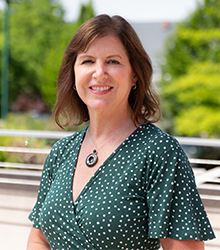
Leslie Leve
Biography
Dr. Leve will not be accepting new PhD students in either Counseling Psychology or Prevention Science for the 2026-2027 academic year.
Professor Leve is the Lorry Lokey Chair in Education and a “double duck,” receiving her masters and doctorate at the University of Oregon in the ‘90s in the College of Arts and Sciences and returning to the university in 2013 as a professor in the College of Education.
Professor Leve is best known for her research on child and adolescent development, gene-environment interplay, and interventions for children, families, and communities. This includes preventive intervention studies with youth in foster care or juvenile justice system, adoption studies that examine the interplay between biological and social influences on development, and health intervention outreach programs for communities. She co-directs a Center on parenting in the context of opioid use. To date, she has published more than 250 scientific articles and 20 book chapters. Her research has been funded by grants from the National Institutes of Health, the National Institute of Justice, the U.S. Department of Education, and the Oregon Health Authority.
Professor Leve typically takes one new doctoral student, one new masters students, and three undergraduate students each year.
Education
PhD, 1995, University of Oregon
Major: Developmental Psychology
Advisor: Beverly Fagot, Ph.D.
MS, 1991, University of Oregon, Eugene, OR
Major: Psychology
BA, 1990, University of California, Santa Cruz, CA
Major: Psychology
Honors and Awards
2024 Service Award, Society for Prevention Research
2022 Fellow, Society for Prevention Research
2021 Outstanding Researcher Award, University of Oregon
2017 Fund for Faculty Excellence Award, University of Oregon
2017 Alumni Faculty Professor, College of Education, University of Oregon
2011 Prevention Science Award, Society for Prevention Research
Publications
Publications (Sample)
Leve, L. D., Kanamori, M., Humphreys, K. L., Jaffee, S. R., Nusslock, R., Oro, V., Hyde, L. W. (2024). The promise and challenges of integrating biological and prevention sciences: A community-engaged model for the next generation of translational research. Prevention Science, 25, 1177–1199. https://doi.org/10.1007/s11121-024-01720-8
Leve, L. D., Oro, V., Natsuaki, M. N., Harold, G. T., Neiderhiser, J. M., Ganiban, J. M., Shaw, D. S., DeGarmo, D. S. (2024). The pernicious role of stress on intergenerational continuity of psychopathology. Development and Psychopathology, 36(5), 2376-2389. https://doi.org/10.1017/S0954579424000191
Leve, L., Anderson, D., Harold, G., Neiderhiser, J., Natsuaki, M., Shaw, D., Ganiban, J.M., Reiss, D. (2022). Developmental profiles of child behavior problems from 18 months to 8 years: The protective effects of structured parenting vary by genetic risk. Development and Psychopathology 34(5), 1716-1730. https://doi.org/10.1017/S0954579422000839
Leve, L. D., Harold, G. T., Neiderhiser, J. M., Natsuaki, M. N., Shaw, D. S., Ganiban, J. M., & Reiss, D. (2022). The potential of children’s rearing environment to overcome genetic propensity for low reading achievement. Mind, Brain, and Education, 16(4), 352-359. https://doi.org/10.1111/mbe.12332
Leve, L. D., Schweer-Collins, M., & Bates, E. (2022). Criminal offense charges in women: A 10-year follow-up of an RCT of Treatment Foster Care Oregon. Journal of Consulting and Clinical Psychology, 90, 901-910. https://dx.doi.org/10.1037/ccp0000764
Cioffi, C. C. & Leve, L. D. (2020). Substance abuse treatment, parenting, and COVID-19. Journal of Substance Abuse Treatment, 119, 108148.
Leve, L. D., Neiderhiser, J. M., Ganiban, J. M., Misaki, N. N., Shaw, D. S., & Reiss, D. (2019). The Early Growth and Development Study: A dual-family adoption study from birth through adolescence. Twin Research and Human Genetics, 22, 716 - 727. https://doi.org/10.1017/thg.2019.66
Leve, L. D., Neiderhiser, J. M., Harold, G. T., Natsuaki, M. N., Bohannan, B. J. M, & Cresko, W. A. (2018). Naturalistic experimental designs as tools for understanding the role of genes and the environment in prevention research. Prevention Science, 19(1), 68–78. doi: 10.1007/s11121-017-0746-8 PMC: 5511771
Leve, L. D., Chamberlain, P., & Kim, H. K. (2015). Risks, outcomes, and evidence-based interventions for girls in the U. S. juvenile justice system. Clinical Child and Family Psychology Review, 18(3), 252–279. doi: 10.1007/s10567-015-0186-6. PMC: 4536111
Research
Professor Leve’s research is grounded by three core values.
First, collaborations that include individuals from a range of career stages and disciplinary perspectives are prioritized. When we have the opportunity to talk about and conduct research from multiple vantage points, we can generate new ideas and approaches that advance the field and make an impact on human health in exciting ways.
Second, advancing discoveries in the field of prevention science can be best achieved through both basic research and intervention studies. Ideally, the two approaches are integrated with feedback loops that inform one another.
Third, a priority focus is improving the wellbeing of individuals and communities. There is clear evidence that many children, families, and communities are struggling in terms of their physical health, mental wellness, and/or economic standing. Research and practice efforts should focus on lifting up those who can benefit most from supports.
Professor Leve is currently focusing her research on: (1) promoting healthy outcomes for parents with substance use histories; (2) incorporating genetic data to refine the understanding of how one’s family and contextual environment can promote healthy outcomes for children and adolescents; (3) examining the adult outcomes of juvenile justice involvement; and (4) delivering health interventions to youth and communities in Oregon. She collaborates with local, national, and international colleagues to conduct this research, including colleagues within the University of Oregon as well as external colleagues at Oregon Social Learning Center, Penn State, George Washington University, the University of Pittsburgh, the University of California, Riverside, and the University of Cambridge, UK. These collaborations include numerous students, postdocs, and research associates.
